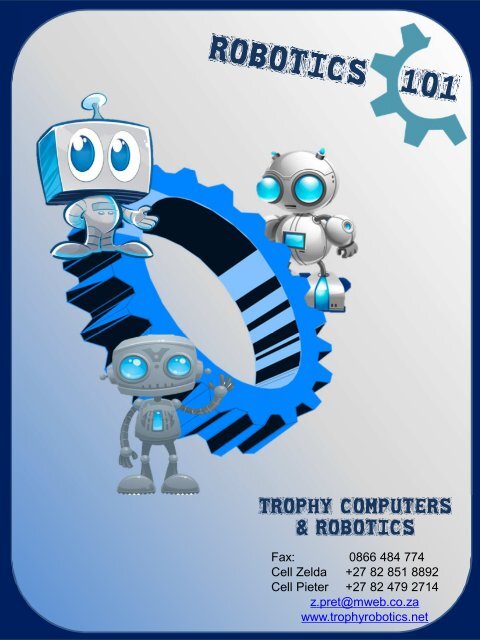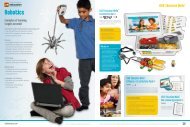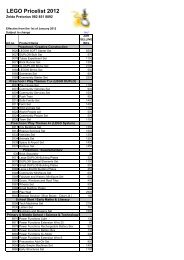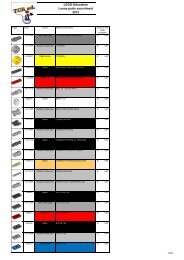TCR Marketing 2012 - Trophy Robotics
TCR Marketing 2012 - Trophy Robotics
TCR Marketing 2012 - Trophy Robotics
- No tags were found...
You also want an ePaper? Increase the reach of your titles
YUMPU automatically turns print PDFs into web optimized ePapers that Google loves.
<strong>Trophy</strong> Computers& <strong>Robotics</strong>Fax: 0866 484 774Cell Zelda +27 82 851 8892Cell Pieter +27 82 479 2714z.pret@mweb.co.zawww.trophyrobotics.net
What would we do without…A car… A phone… Electrical gadgets…Internet…Time saving technology & inventions?We would be stuck, highly frustrated and BORED.Why? What happened?What has changed our lives these past few years?TECHNOLOGY INVENTORS ENGINEERSNew technologies arebeing introduced at anever increasing rate.These new technologieswill change our society inways we can onlyimagine. How do weprepare society to meettomorrow’s challenges?•Who would fix these gadgets if it breaks or who will think of new things for thefuture?•Will it be your child perhaps??•Who will introduce him / her to the fundamentals of technology?•Will they even know that there is a career opportunity in robotics when theyhave to choose their school subjects for the future?<strong>Trophy</strong> <strong>Robotics</strong> is the place where your child would like to be!! 2
Creative problem-solving?As a parent or teacher, if you’ve ever seen a child use a paper towel tube for a telescope, oran empty cardboard box as a car, fort, boat etc., you’ve witnessed the natural flexibility of achild’s thinking. It is, in fact, natural for children to see an object in many ways at the sametime. As we get older, however, our brains become more trained to think in standard ways.Because of this, we tend to lose some of the natural flexibility of our thinking… limiting ourcreativity. And good creative thinking skills are necessary for good problem solving, in anyareas of life! As adults, we all know that being able to create new and different solutions tostubborn problems is often the key to success.Build a child – build a robot!So, how might you help your children to continuedeveloping their flexible thinking? <strong>Trophy</strong> Computers &<strong>Robotics</strong> (<strong>TCR</strong>) provide perfect opportunities for kidsizedproblem solving by presenting situations, whichcall for an inventive solution… by using specializedLEGO® school sets, where the goal is:to be able to build and program driving and walkingrobots!By designing and making their own solutions to the <strong>TCR</strong> challenges, children will be learningand practicing many other important skills involved in problem-solving. For example, whenworking in a group with other children, your child will gain experience in learning to cooperatewith others, to compromise, negotiate, make decisions, practice leadership,develop patience and self-confidence, see another’s viewpoint… it’s important play!Other advantages of project work are the development of individual communication skillssuch as speaking, listening, explaining one’s own ideas, describing one’s "work" to others,and asking questions about someone else’s ideas.Don’t we all have to do this as adults?A group project approach will allow childrento find their individual strengths whilecontributing to the efforts of the whole.It becomes natural to appreciate thateach builder brings gifts to the final,fabulous outcome!Build a child - Build a robot…...It’s a life changing event!3
When your child is building, he or she is developing manyimportant skills.A few are:PhysicalFine motor skills and hand-eye coordinationEmotionalPatience and self-expressionSocialSharing and team workThinkingPlanning, analyzing, imagining, inventing and problemsolvingConcept development Science, Technology & MathematicsLanguage development Describing inventions and processesChildren have great talents for learning - for them it is as natural as breathing!The word robotics refers tothe process of teachingchildren about these amazingand wonderful machines thatwe call “robots”.In short:What does all this mean?Why do our kids need to do it?For a summary,please turn over…4
MECHANICAL TECHNOLOGY @ workMechanical Technology focuses on technological processes from conceptual design to practical problemsolving and the application of scientific principles.Mechanical Technology draws from the following knowledge fields:Mechanical Engineering Environmental Engineering Metallurgic EngineeringAutomotive engineering Designing Maintenance ManagementBoilermaking Welding Aircraft / space technologyMachiningand fitting in the metalengineering industryEarth-moving and miningindustry• The emphasis in Mechanical Technology is on the Technological Process.• Technical skills are acquired in the process of developing or making a particular model.• The concept and development of the model should solve an identified challenge and showresponsibility towards the environment and the health of others.The Technological Process• identify and investigate,• design and make,• evaluate and communicate.• Creativity, innovation and ingenuity also play a major role.The integration of knowledge and skills acrosssubjects and terrains of practice is crucial forachieving applied competence. Appliedcompetence aims at integrating three discretecompetences namely, practical, foundational andreflective competencies. In short: it seeks topromote integrated learning of theory, practice andreflection.Progression in Mechanical Technology is theprocess of developing more advanced and complexknowledge and skills as you grow older.Learning acoss the curriculum: all four LearningOutcomes of Mechanical Technology have stronglinks with other Learning Areas.Summary:Knowledge - memorises and recalls information:Comprehension (understanding) - interpret information in one’s own wordsApplications - apply knowledge to new situationsAnalysis - breakdown knowledge into parts and show relationship among partsSynthesis - brings together parts of knowledge to form a wholeEvaluation - makes judgments on basis of criteria5
•What is a robot?•At its most basic a robot is a machine that senses the world,processes the sensor information with a computer and thendoes something in response to that information (such asmoving or turning).•A robot isn’t just a computer. A desktop computer can “sense”that you are typing or moving the mouse, but the computer itselfdoesn’t move or act in the physical world.Where can I find a robot?Many everyday objects around you are a lot like robots. A car withcruise controlsenses how fast the car is movingand then changesthe car’s accelerationso that the car’s speed stays constant. Athermostatin a room senses what temperaturethe room is and thenit turns on a heater or air conditioner to bring the room to the righttemperature.Many people assumeall robotsare charactersin science-fictionmovieslike the Terminatoror R2D2 in Star Wars. In fact, robots are used all overthe world, right now! Robots build cars, clean houses, help soldiersanddoctors, are played with by kids and explore other planets. They maynotlook like the robotswe see in the movies but they are still doing importantjobs. Robots can also be very powerful tools for learning. Kids all over theUnited States are using robots in their classroomsand out-of-school tohelp them learn science, technology,engineering, and math(STEM)topicsin new and innovativeways.How do robots learn about theworld around them?•Robots are often equipped with a variety of sensors that allow them to collectinformationabout their environment. Depending on its task, a robot might havea wide variety of sensors. Some of the most commonsensors that robots useinclude: Cameras to find objects, people, or other robots GlobalPositioningSystem (GPS) receivers to determinethe robot’slocation Laser rangefinders to determine the distance between the robot and other objects Light sensors to detect how bright the robot’s environment is Temperaturesensors to detect how hot or cold the robot’s environment is Touch sensors to tell the robot if it has bumpedinto something
•??•Who makes robots?•<strong>Robotics</strong> is a multi-disciplinary field; it takes a lot of differentexpertise to design, build and program a robot. Often mechanicalengineers, electrical engineers, computer scientists, industrialengineers and industrial designers are all involved.•Mechanical engineers design all of the physical parts of the robot –parts like the chassis, motors,armsand hands, wheels, tracks or legs.Electricalengineers design all of the circuitsand wiringthat theinternal computer will use to control the robot. Computerscientists program the robot; they write the softwarethat takes theinformationfrom the robot’s sensors, processes it and then tells therobot how to act. For robots that are mass-produced, industrialengineers are needed to figureout how a factorycan makeall of therobot’s parts and in what order they should be put together. Industrialdesigners look at all the different parts of the robot and figure out how itwill look on the outside– what color will its chassisbe? Whereshouldthe companylogo go?•What does the future hold for robotics?•In the future robots may be used to help doctors examine patientswho are far away, to help carry injured people out of disaster areas,to assist senior citizens or people with disabilities or even to inspectbridges for signs of wear. Scientists and engineers all over theworld are developing robots that can help people in homes oroutside, on land, in the water and in the air. Keep your eyes openand watch for these amazing robots!•Robots 101 is brought to you by iRobot SPARK incelebration of National <strong>Robotics</strong> Week.•For more cool robot activities, visit spark.irobot.comand www.nationalroboticsweek.org!Why is robotics important?<strong>Robotics</strong> technology is a growing industry which creates high-tech jobsin the world.<strong>Robotics</strong> technologies are helping to improve healthcare, nationaldefence, security, energy, manufacturing, logistics, transportation,agriculture, education, consumer goods, and many other sectors<strong>Robotics</strong> provides an exciting, hands-on way for students to learnScience, Technology, Engineering, and Math
Objectives:<strong>Trophy</strong> <strong>Robotics</strong> ClubDevelop problem-solving skills, which may be used in all aspects of life.Develop the ability to evaluate technological products / processes from thefunctional, economic, environmental and aesthetic points of view.Develop the ability to design and build independently some simple productswhich will fulfill certain requirements defined either by the learners or by others.Cultivate self-confidence, because technological problems have no unique solution andthere are an endless number of possible solutions.Promote innovation and creativity, as well as management and communication skills(verbal and graphical) through multi-disciplinary activitiesHave FUN!!Curriculum::Pre-school: (only in Vanderbijlpark)Theme based building Basic building skills Communication skills Listening skills Negotiating skills Build according to the themeLevel 2Mechanics Structures Wheels & axles Gears Levers Pulleys Follow building plans/3D models Change model creatively afterwardsLevel 4<strong>Robotics</strong> Intro Basic robot building Basic programming Sensors and attachments Problem solving obstacle fields Intermediate Project management FLL & NRO competitionsLevel 1Basic skills Basic mechanical building skills Strengthening methods Communication skills Follow facilitator step-by-stepLevel 3Applied mechanics Every day machines Steering drives & lifters Cranes etc. 4 Key-step building plans. Logical thinking and deduction Jnr. FLL Project to conclude mechanics Jnr project managementLevel 5Advanced robotics Applied robotics Advanced programming Problem solving projects Snr. Project management FLL & NRO Competitions
There are 5 different Natural Learning drives that areinherent in all people, drives that <strong>TCR</strong> incorporates in itsprojects:Using our bodies, Forming identity, Self-expression, Social relations and Making sense.Children intuitively, constantly strive to do better what they already like to do and cando well. At the same time they will also seek new challenges, invent new ways toacknowledge. These are some of the driving forces in their learning and developmentalprocesses. Our natural desire to learn is catalyzed by a biological feedback system whichimpels us toward new challenges, new learning. When you do something that makesyou feel more competent than before, you experience a feeling of accomplishment thatdrives you towards new learning to get new positive feedback. You are in "flow".Just think of children learning how to ride a bike. If a 2-year old had to keep his balance,pedal and steer on a normal bicycle, he would be very frustrated and give up. But usinga tricycle the 2-year old will be optimally challenged and experience the positivefeedback that drives him further in the learning process:the bicycle with stabilizers.And what a wonderful experience it is one day to remove the stabilizers!ARE YOU READYTO DRIVEYOURROBOT?Find out how to enroll on pages 14&15!!10
Important notes for <strong>2012</strong>Class fees for <strong>2012</strong>Annual Registration feeTime to payDiscountPublic schools( R420x 4), Private schools (R550x3)R100 is payable to help cover the cost of lost piecesFees are payable within the 1 st two weeks of each term please.R100-00 discount if you pay all the money for the year before the endof February <strong>2012</strong>!Cancellation notesPublic holidays:CalendarNo refundsWill be appreciated when your child does not continue with class.No classes.please check our website often for the important datesIf you have paid the class fees and for some reason you do not wish tocontinue with class, you will not receive a refund.Classes missedCommunicationChequesIf we miss a class for some reason, we will contact you to arrange forextra time. If your school is closed on the day/time of our class for anyschool related issues/strikes, I am not obligated to catch up on thatclass.primarily by email or SMS. Please keep your details updated.made out to <strong>Trophy</strong> Computers & <strong>Robotics</strong>www.trophyrobotics.netATTITUDEBegin by alwaysexpectinggood things to happen.
Zelda 082 851 8892Fax: 0866 484 774z.pret@mweb.co.zawww.trophyrobotics.netThe sports club for the young scientists and engineers of all ages!!We live in a world surrounded by machinesand gadgets. Children are very inquisitive andthe question “How does this work?” is oftenthwarted by a cover hiding the mechanism,or a warning not to touch for the sake ofsafety.As children explore our robotics kits, their curiositywill be stimulated rather than dampened.Confidence and positive attitudes will develop alongwith skill and understanding.Students today need to prepare for theirfuture like they are preparing for theOlympics.The only problem is they won’t knowwhat event they will compete in untilthey get there. Children’s approaches to solvingproblems are influenced by priorexperience Problem solving is concerned with theapplication of knowledge and skills Children who are actively involved inlearning develop the ability to seerelationships and apply concepts andunderstanding Working in small groups has value inpromoting interaction skills andinvolvement in creativity and discovery Success with realistic activitiesenhances language development aschildren describe experiences whichare enjoyable and involving.The <strong>Trophy</strong> <strong>Robotics</strong> club engages children aged 6 upwards to design, build (and programfor the older kids) micro robots / machines using educational LEGO® sets.<strong>Trophy</strong> <strong>Robotics</strong> is the place where your child would like to be!!
Knowledge should emerge from problem situations so that students “have a strongconceptual basis for reconstructing their knowledge at a later time.”National Council of Teachers of Mathematics“Knowing” mathematics is “doing” mathematics.”Important notes:Class times <strong>2012</strong>:Class fees:(payable in advance)Choose a venue and time from the websiteR100 registration fee - annuallyPublic school = R420/term/child (x4 terms)Private schools = R550/term/child (x3 terms)<strong>Robotics</strong> grading:From <strong>2012</strong> we will have robotics grading at the end of Juneand November for those members that want certificatesand/or medals.It is not compulsory, but it is a way for the kids to see if theyhave mastered the work of that half year and can applywhat they have learned.More information will be on our website about this newgrading system.The reason for this grading system: Some of our colleaguesare in the final stages of negotiation to get roboticsaffiliated to receive national colours when we competeinternationally.Build a child - Build a robot…...It’s a life changing event!Please visit our website for more detailsabout venues, times, competitions,grading and calendar:www.trophyrobotics.net<strong>Robotics</strong> Club enrolmentFax (0866 484 774) or email this form back to me (z.pret@mweb.co.za)Name & Surname of child: _______________________________________________School_______________________________________Grade:____________________________Venue to attend: ___________________________________ Time: ____________________________Mother: ______________________________Father _______________________________Cell nr_______________________________Cell nr_________________________Email : _____________________________________________________________________________________________Signed (parent)Registration is valid until you give notice!_____________________Date
<strong>Trophy</strong> Computers & <strong>Robotics</strong>ATTITUDEBegin by alwaysexpectinggood things to happen.Vaaldriehoek, Gauteng, Pretoriawww.trophyrobotics.net082 851 8892 / 082 479 2714





